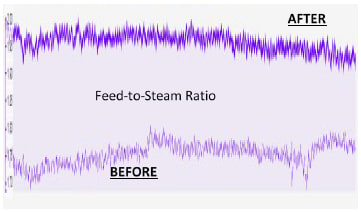Executive Summary
A global leader in specialty chemical, fiber, and resin production operates a plant in the Houston, Texas area. This plant is the largest producer of polyvinyl alcohol (PVOH) in the world. It produces 40,000 metric tons of PVOH annually. The PVOH is used in a wide range of industries, including paper, textile, emulsion, PVC, construction, adhesives, and films.
PVOH is produced commercially from vinyl acetate monomer by a continuous process. The acetate groups are hydrolyzed by an ester interchange with methanol in the presence of anhydrous sodium methylate or aqueous sodium hydroxide. Vinyl acetate monomer is produced by reacting acetic acid, oxygen, and ethylene in the presence of a catalyst. Methanol and acetic acid are intermediates required for the manufacture of PVOH.
Yokogawa assisted in the project implementation by providing step testing, model identification, model acceptance, pre-commissioning, training of operators and engineers, commissioning, controller tuning, and post implementation review. Yokogawa continues to work with the manufacturer to address nonlinearities and further improve the column operation to maximize the benefits.

Challenges
The methanol unit and the acetic acid unit consist of distillation columns with very long settling times on the order of 4-6 hours. During feed modulation, some of the temperatures in the column body exhibit complex non-linearities, which make the column control and operation difficult. The first column in the methanol unit is a methyl acetate extractive distillation column, the distillate is methyl acetate-water azeotrope, and the bottoms consist of aqueous methanol feeding the second column. The bottoms of the second column feed aqueous methanol to the third column.
The unique challenge is that the reboiler of the second column does not have an independent steam supply as in a typical column. A portion of the overhead vapors from the third column supplies reboiler heat to the second column. After heating the reboiler in the second column, the vapors from the third column are condensed and enter the reflux drum for the third column.
This heat integration between the second and third columns conserves energy by reducing steam consumption, as independent steam from the steam header is not needed.
However, this makes the operation of the second and third methanol columns very interactive and challenging. Additional complexity and operational difficulty are caused by the interaction between the bottom’s sump level control and the feed to the third column. Level controllers using PID algorithms can often cause some mild ripples and oscillations, even with optimal tuning, due to unmeasured disturbances.
The heat integration between the overhead vapor and the reboiler plus the mass balance integration between the bottoms level and the feed flow create a menacing challenge for the operator. Even the most experienced operators struggle to keep the columns in stable equilibrium manually. Cycling and instability quickly result in column upsets. Since the columns are tall with numerous trays, settling times are long. Restoring the columns to their normal operating boundaries takes a long time.
Solution
The end-user team decided to apply the PACE software product. PACE stands for Platform for Advanced Control and Estimation. The manufacturer wanted PACE to automate the process units, minimize reflux flows, minimize reboiler steam flows, and help relieve some of the operator’s stress and work chores. Yokogawa conducted step tests, identified the dynamic models, and implemented the PACE software for the methanol unit.
Between 2018 and June 2021, before PACE was installed, the third methanol column flooded a total of 42 times.
After completion of the PACE APC project, the number of flooding events was reduced to zero due to excellent multivariable control of the column feed, level control, and reboiler duty control. The feed to the third column was significantly stabilized, which, in turn, stabilized the overhead vapor flow. That stabilized the reboiler duty to the second column. Subsequently, the entire integrated loop was stabilized.
Another significant benefit from the PACE APC project was control of the water quantity in the columns. PPM levels of water in the column overheads are measured continuously by an online gas chromatograph. During 2020, the columns trended off-spec on water 35 times. During the first half of 2021 prior to the PACE APC project completion, the columns were off-spec 31 times. Since PACE APC installation and commissioning, there have been no water spec excursions. The water spec fluctuated significantly prior to PACE APC but now the water PPM control is much more stable.
A comparison between the water spec before and after the PACE APC project are shown in the trend plots here:

The wild oscillations and deviations on the water specification were eliminated after the successful commissioning of PACE APC software.
Another notable improvement of high interest and value to the manufacturer was the reduction in the overall energy consumption. The PACE APC software consists of an optimization module that is programmed to maximize the feed and minimize the utilities based on costs of raw materials, utilities, and the values of products. Before the PACE project, at a typical fixed feed rate of 94K, the column feed-to- steam ratio had been 1.75. After the PACE project, at the same feed rate, feed-to-steam ratio now is 1.96. Please refer to the feed-to-steam ratio comparisons in the trend plot below.

Customer Satisfaction
End-user engineers, operators, and managers have been impressed by the reduction in steam, elimination of column flooding upsets, and elimination of water specification excursions. They have also been very pleased with the level of support provided by the Yokogawa team.
Industries
-
Specialty & Fine Chemical
Yokogawa has long served customers in the specialty and fine chemicals market. With a market leading batch solution that offers the best in class reliability and flexibility as well as industry experts who understand the complex requirements in designing a batch solution, you can be assured that in your partnership with Yokogawa you will have a system that will enable you to produce products that meet your customers’ needs in the future while maintaining safety and regulatory compliance.